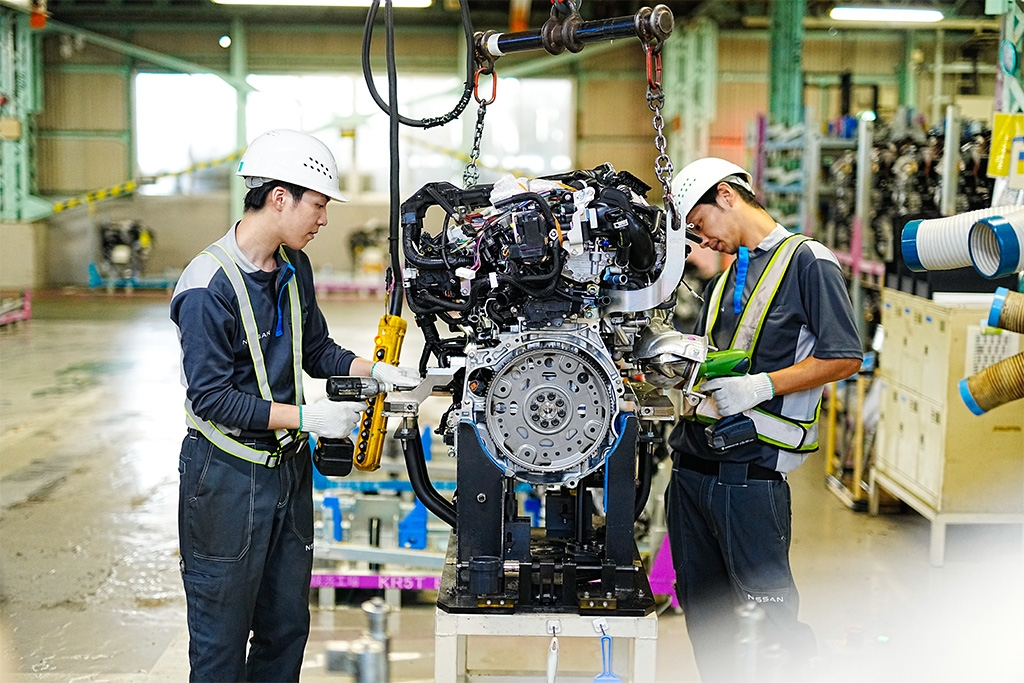Nissan Yokohama plant produces landmark 40 millionth engine
25 Jul 2023|222 views
The future for combustion engines may not be the brightest at present moment - but that just makes any reason to look back fondly on its history and progression through time all the more welcome.
And here's a good one: Nissan has just announced that its Yokohama Plant - in operation since 1935 (just two years after Nissan was founded) - has produced its landmark 40 millionth engine.
After building its 10th million engine in 1976, the 20 millionth and 30 millionth milestones came in quick succession there after - in 1986 and 1997 respectively (in other words, with a gap of approximately only one decade each). It has since taken another 26 years to hit the 40 millionth milestone.
Understandably, the staggering figure is still cause for celebration, and comes serendipitously at a time when Nissan is celebrating its 90th anniversary. Commenting on the milestone, plant manager of Yokohama Plant, Tamiyo Wada credited the many customers around the world who had embraced Nissan's cars as instrumental to numbers achieved. In its decades of operation thus far, Yokohama Plant has left its mark on combustion-engine history more than once.
Firstly, it was responsible for producing the 1979 L20ET, Japan's first turbocharged passenger-car engine that served duty in the C210 and R30 Nissan Skylines, among others. Later on, it would also produce the 1983 VG (later spawning an entire VG engine family), Japan's first mass-produced V6 engine.
On the note of V6 engines, the baton at Yokohama has since been passed on to the VR38DETT engine today, which is hand-assembled by skilled takumi master craftspeople for the R35 Nissan GT-R.
The Yokohama Plant has additionally produced the VC Turbo engine since 2017, which relies on a variable compression ratio (hence the name) to arrive at an unprecedented mix of high power output and high fuel efficiency simultaneously. One model utilising the engine today is the latest X-Trail e-POWER.
As for what Yokohama Plant might look like moving forward, the site started producing electric motors when the first-generation, all-electric Nissan Leaf was launched in 2010, and continues to do so for e-POWER models such as the Note e-POWER. The fiscal year of 2022 saw such motors accounting for around 40% of the Plant’s production.
Nissan has grander plans still for Yokohama Plant. The site will serve as a pilot plant for the development of powertrain production technology, and should introduce a pilot line next year for the development of solid-state batteries.
The future for combustion engines may not be the brightest at present moment - but that just makes any reason to look back fondly on its history and progression through time all the more welcome.
And here's a good one: Nissan has just announced that its Yokohama Plant - in operation since 1935 (just two years after Nissan was founded) - has produced its landmark 40 millionth engine.
After building its 10th million engine in 1976, the 20 millionth and 30 millionth milestones came in quick succession there after - in 1986 and 1997 respectively (in other words, with a gap of approximately only one decade each). It has since taken another 26 years to hit the 40 millionth milestone.
Understandably, the staggering figure is still cause for celebration, and comes serendipitously at a time when Nissan is celebrating its 90th anniversary. Commenting on the milestone, plant manager of Yokohama Plant, Tamiyo Wada credited the many customers around the world who had embraced Nissan's cars as instrumental to numbers achieved. In its decades of operation thus far, Yokohama Plant has left its mark on combustion-engine history more than once.
Firstly, it was responsible for producing the 1979 L20ET, Japan's first turbocharged passenger-car engine that served duty in the C210 and R30 Nissan Skylines, among others. Later on, it would also produce the 1983 VG (later spawning an entire VG engine family), Japan's first mass-produced V6 engine.
On the note of V6 engines, the baton at Yokohama has since been passed on to the VR38DETT engine today, which is hand-assembled by skilled takumi master craftspeople for the R35 Nissan GT-R.
The Yokohama Plant has additionally produced the VC Turbo engine since 2017, which relies on a variable compression ratio (hence the name) to arrive at an unprecedented mix of high power output and high fuel efficiency simultaneously. One model utilising the engine today is the latest X-Trail e-POWER.
As for what Yokohama Plant might look like moving forward, the site started producing electric motors when the first-generation, all-electric Nissan Leaf was launched in 2010, and continues to do so for e-POWER models such as the Note e-POWER. The fiscal year of 2022 saw such motors accounting for around 40% of the Plant’s production.
Nissan has grander plans still for Yokohama Plant. The site will serve as a pilot plant for the development of powertrain production technology, and should introduce a pilot line next year for the development of solid-state batteries.
Latest COE Prices
December 2025 | 2nd BIDDING
NEXT TENDER: 07 Jan 2026
CAT A$109,501
CAT B$115,102
CAT C$77,003
CAT E$119,000
View Full Results Thank You For Your Subscription.






















